Education, Culture, and Opportunity: My Life vs. My Mother's Life
VerifiedAdded on 2021/06/17
|9
|2920
|24
Essay
AI Summary
This essay provides a detailed comparison between the life of a student and their mother, focusing on the significant generational differences in education, opportunities, and cultural experiences. The author discusses their mother's challenging upbringing in rural Thailand, highlighting the lack of educational resources, societal expectations, and financial constraints she faced. The essay contrasts this with the student's modern experiences, which include access to technology, better infrastructure, and greater opportunities. The author reflects on their mother's resilience and determination in overcoming obstacles to achieve her educational goals, expressing gratitude and admiration for her. The essay analyzes how the advancements in technology, transportation, and societal attitudes have shaped the student's life, making it considerably more comfortable than their mother's. The author concludes by emphasizing the importance of appreciating the sacrifices made by previous generations and drawing inspiration from their hard work and perseverance. This assignment is available on Desklib for students to study and learn.
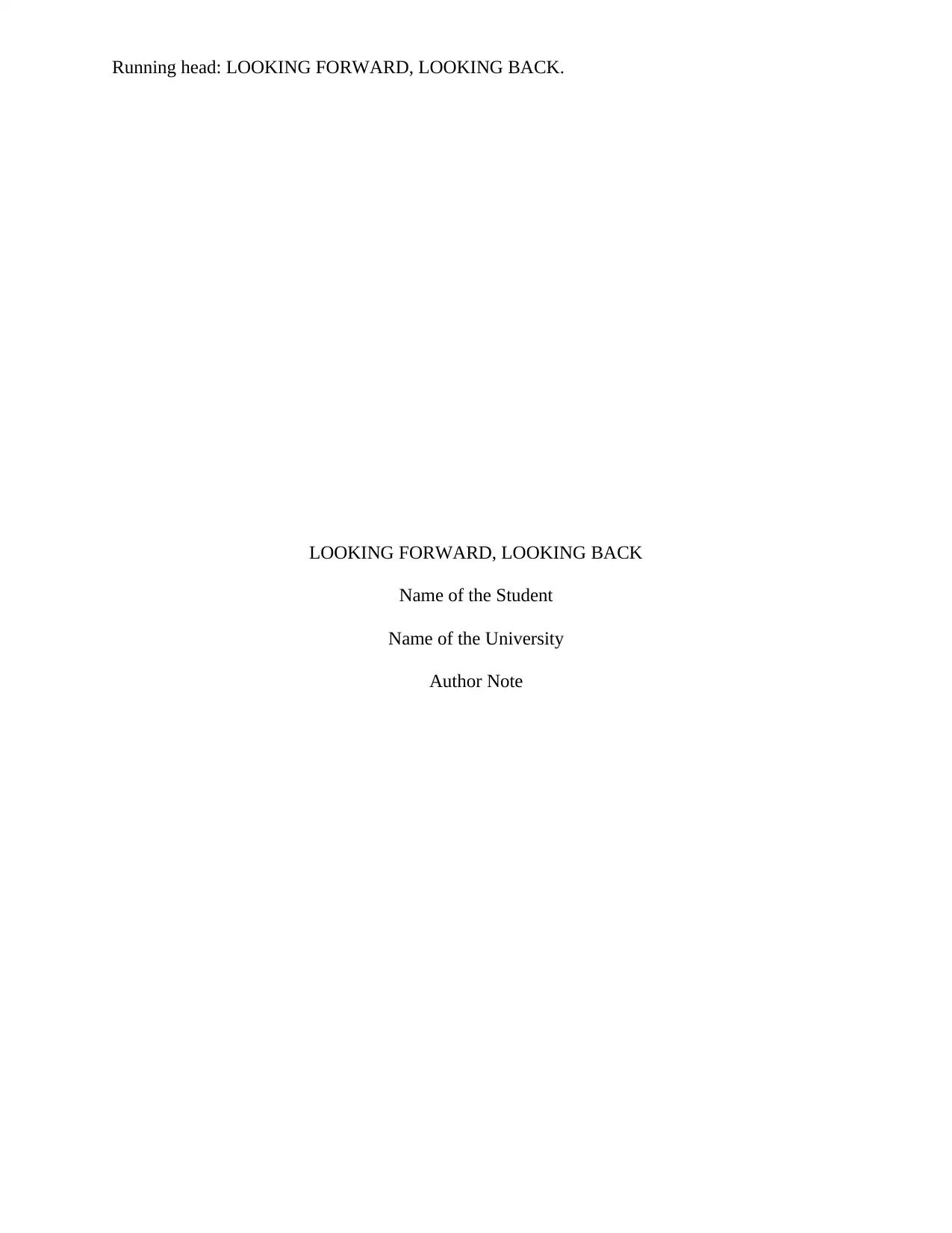
Running head: LOOKING FORWARD, LOOKING BACK.
LOOKING FORWARD, LOOKING BACK
Name of the Student
Name of the University
Author Note
LOOKING FORWARD, LOOKING BACK
Name of the Student
Name of the University
Author Note
Paraphrase This Document
Need a fresh take? Get an instant paraphrase of this document with our AI Paraphraser
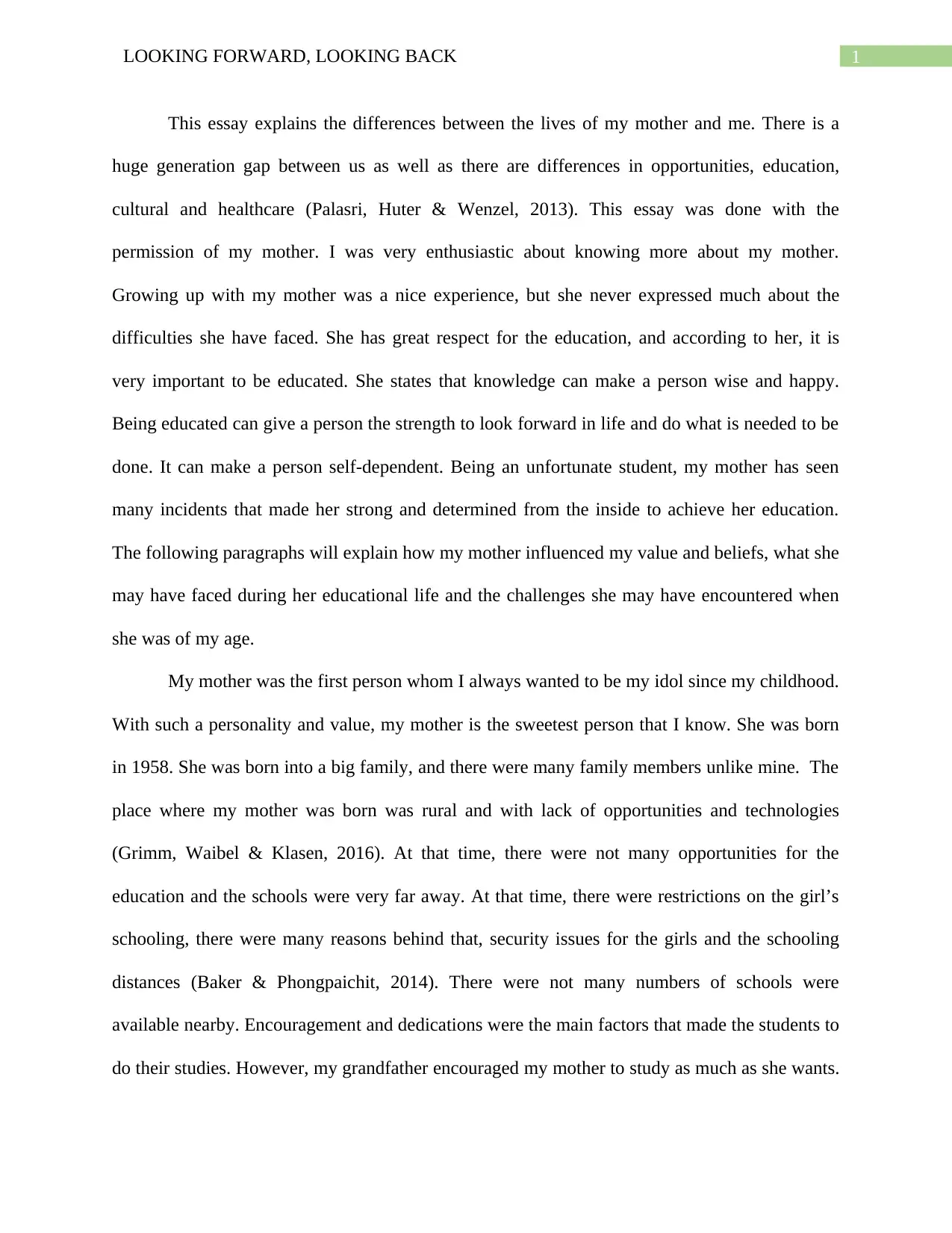
1LOOKING FORWARD, LOOKING BACK
This essay explains the differences between the lives of my mother and me. There is a
huge generation gap between us as well as there are differences in opportunities, education,
cultural and healthcare (Palasri, Huter & Wenzel, 2013). This essay was done with the
permission of my mother. I was very enthusiastic about knowing more about my mother.
Growing up with my mother was a nice experience, but she never expressed much about the
difficulties she have faced. She has great respect for the education, and according to her, it is
very important to be educated. She states that knowledge can make a person wise and happy.
Being educated can give a person the strength to look forward in life and do what is needed to be
done. It can make a person self-dependent. Being an unfortunate student, my mother has seen
many incidents that made her strong and determined from the inside to achieve her education.
The following paragraphs will explain how my mother influenced my value and beliefs, what she
may have faced during her educational life and the challenges she may have encountered when
she was of my age.
My mother was the first person whom I always wanted to be my idol since my childhood.
With such a personality and value, my mother is the sweetest person that I know. She was born
in 1958. She was born into a big family, and there were many family members unlike mine. The
place where my mother was born was rural and with lack of opportunities and technologies
(Grimm, Waibel & Klasen, 2016). At that time, there were not many opportunities for the
education and the schools were very far away. At that time, there were restrictions on the girl’s
schooling, there were many reasons behind that, security issues for the girls and the schooling
distances (Baker & Phongpaichit, 2014). There were not many numbers of schools were
available nearby. Encouragement and dedications were the main factors that made the students to
do their studies. However, my grandfather encouraged my mother to study as much as she wants.
This essay explains the differences between the lives of my mother and me. There is a
huge generation gap between us as well as there are differences in opportunities, education,
cultural and healthcare (Palasri, Huter & Wenzel, 2013). This essay was done with the
permission of my mother. I was very enthusiastic about knowing more about my mother.
Growing up with my mother was a nice experience, but she never expressed much about the
difficulties she have faced. She has great respect for the education, and according to her, it is
very important to be educated. She states that knowledge can make a person wise and happy.
Being educated can give a person the strength to look forward in life and do what is needed to be
done. It can make a person self-dependent. Being an unfortunate student, my mother has seen
many incidents that made her strong and determined from the inside to achieve her education.
The following paragraphs will explain how my mother influenced my value and beliefs, what she
may have faced during her educational life and the challenges she may have encountered when
she was of my age.
My mother was the first person whom I always wanted to be my idol since my childhood.
With such a personality and value, my mother is the sweetest person that I know. She was born
in 1958. She was born into a big family, and there were many family members unlike mine. The
place where my mother was born was rural and with lack of opportunities and technologies
(Grimm, Waibel & Klasen, 2016). At that time, there were not many opportunities for the
education and the schools were very far away. At that time, there were restrictions on the girl’s
schooling, there were many reasons behind that, security issues for the girls and the schooling
distances (Baker & Phongpaichit, 2014). There were not many numbers of schools were
available nearby. Encouragement and dedications were the main factors that made the students to
do their studies. However, my grandfather encouraged my mother to study as much as she wants.
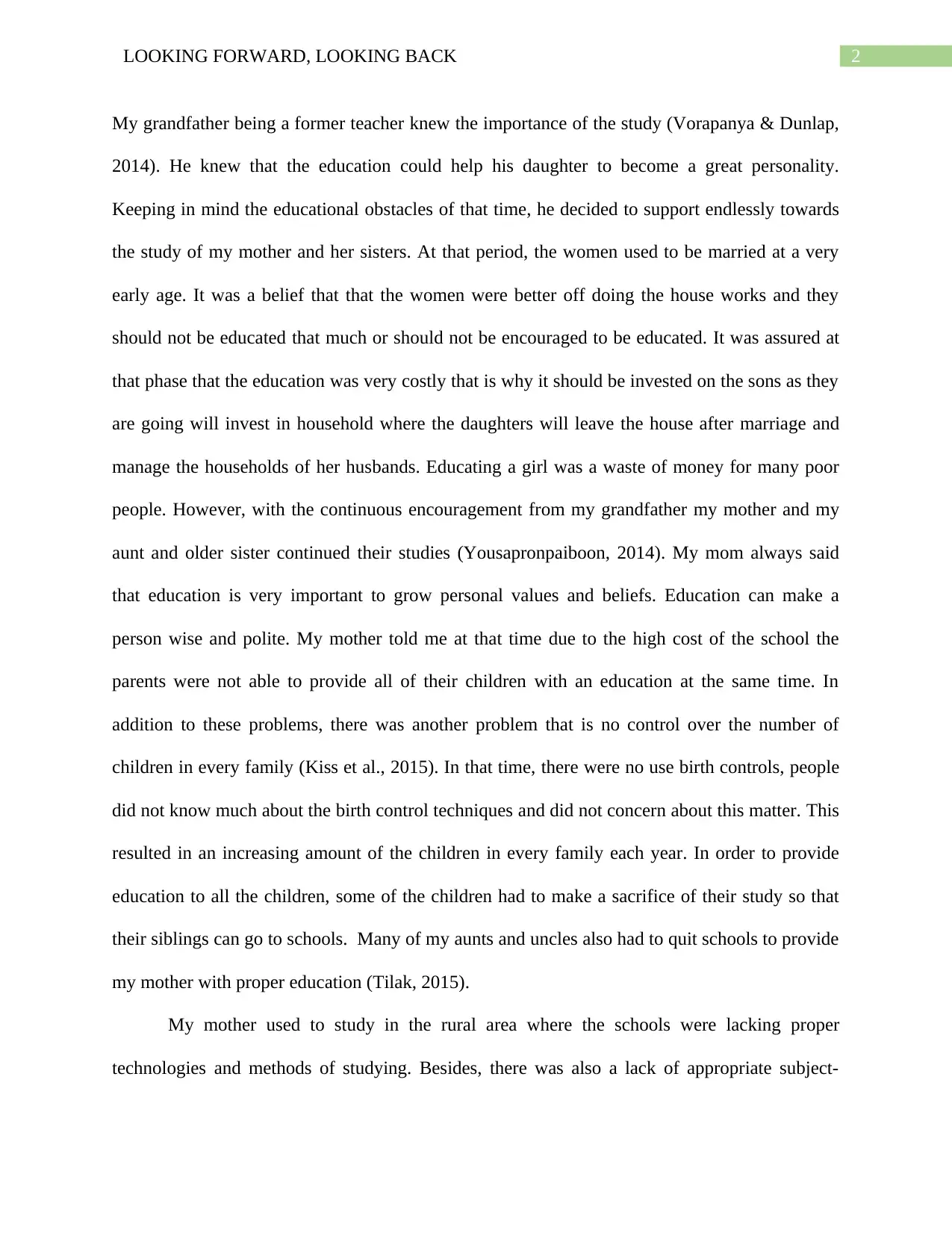
2LOOKING FORWARD, LOOKING BACK
My grandfather being a former teacher knew the importance of the study (Vorapanya & Dunlap,
2014). He knew that the education could help his daughter to become a great personality.
Keeping in mind the educational obstacles of that time, he decided to support endlessly towards
the study of my mother and her sisters. At that period, the women used to be married at a very
early age. It was a belief that that the women were better off doing the house works and they
should not be educated that much or should not be encouraged to be educated. It was assured at
that phase that the education was very costly that is why it should be invested on the sons as they
are going will invest in household where the daughters will leave the house after marriage and
manage the households of her husbands. Educating a girl was a waste of money for many poor
people. However, with the continuous encouragement from my grandfather my mother and my
aunt and older sister continued their studies (Yousapronpaiboon, 2014). My mom always said
that education is very important to grow personal values and beliefs. Education can make a
person wise and polite. My mother told me at that time due to the high cost of the school the
parents were not able to provide all of their children with an education at the same time. In
addition to these problems, there was another problem that is no control over the number of
children in every family (Kiss et al., 2015). In that time, there were no use birth controls, people
did not know much about the birth control techniques and did not concern about this matter. This
resulted in an increasing amount of the children in every family each year. In order to provide
education to all the children, some of the children had to make a sacrifice of their study so that
their siblings can go to schools. Many of my aunts and uncles also had to quit schools to provide
my mother with proper education (Tilak, 2015).
My mother used to study in the rural area where the schools were lacking proper
technologies and methods of studying. Besides, there was also a lack of appropriate subject-
My grandfather being a former teacher knew the importance of the study (Vorapanya & Dunlap,
2014). He knew that the education could help his daughter to become a great personality.
Keeping in mind the educational obstacles of that time, he decided to support endlessly towards
the study of my mother and her sisters. At that period, the women used to be married at a very
early age. It was a belief that that the women were better off doing the house works and they
should not be educated that much or should not be encouraged to be educated. It was assured at
that phase that the education was very costly that is why it should be invested on the sons as they
are going will invest in household where the daughters will leave the house after marriage and
manage the households of her husbands. Educating a girl was a waste of money for many poor
people. However, with the continuous encouragement from my grandfather my mother and my
aunt and older sister continued their studies (Yousapronpaiboon, 2014). My mom always said
that education is very important to grow personal values and beliefs. Education can make a
person wise and polite. My mother told me at that time due to the high cost of the school the
parents were not able to provide all of their children with an education at the same time. In
addition to these problems, there was another problem that is no control over the number of
children in every family (Kiss et al., 2015). In that time, there were no use birth controls, people
did not know much about the birth control techniques and did not concern about this matter. This
resulted in an increasing amount of the children in every family each year. In order to provide
education to all the children, some of the children had to make a sacrifice of their study so that
their siblings can go to schools. Many of my aunts and uncles also had to quit schools to provide
my mother with proper education (Tilak, 2015).
My mother used to study in the rural area where the schools were lacking proper
technologies and methods of studying. Besides, there was also a lack of appropriate subject-
⊘ This is a preview!⊘
Do you want full access?
Subscribe today to unlock all pages.

Trusted by 1+ million students worldwide
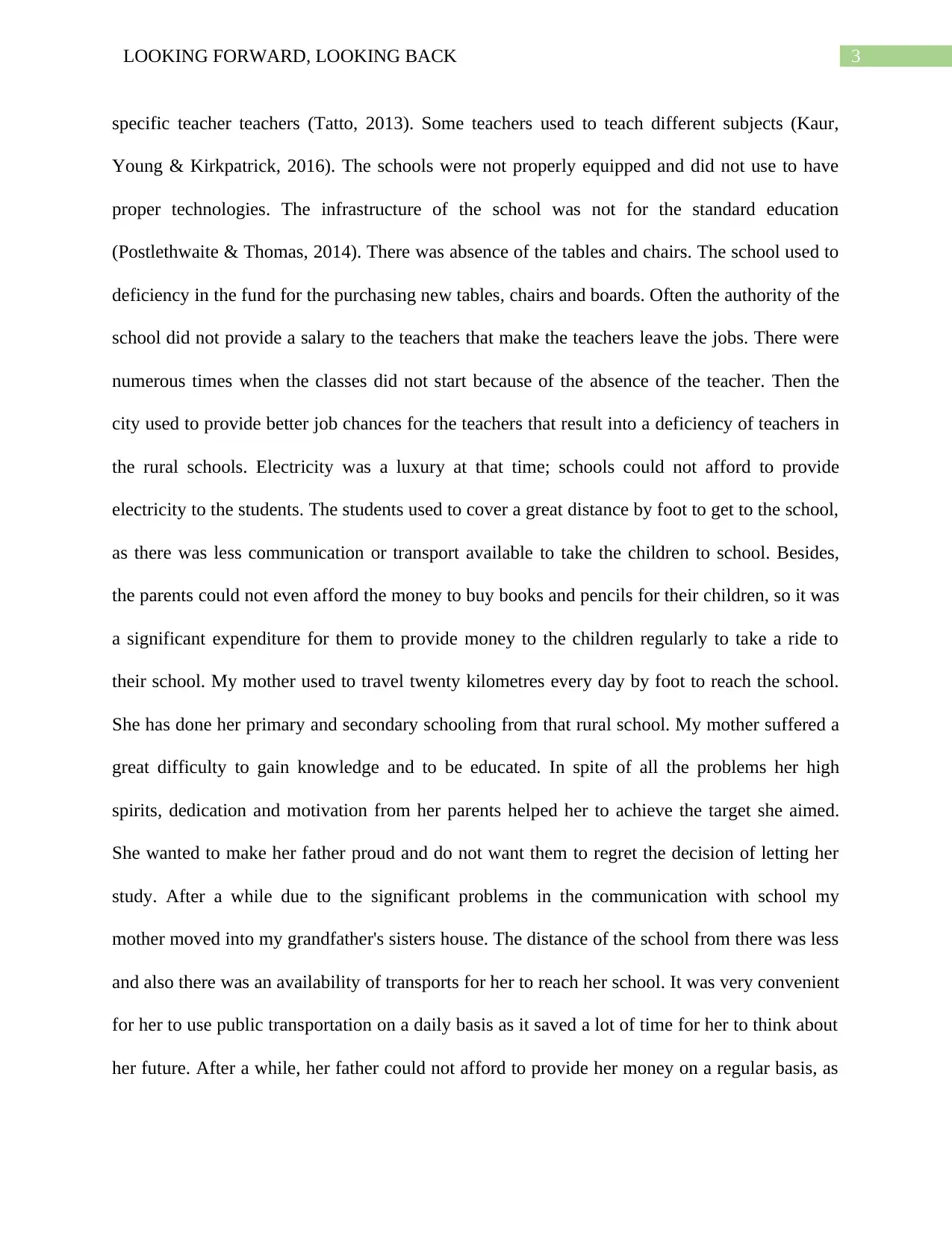
3LOOKING FORWARD, LOOKING BACK
specific teacher teachers (Tatto, 2013). Some teachers used to teach different subjects (Kaur,
Young & Kirkpatrick, 2016). The schools were not properly equipped and did not use to have
proper technologies. The infrastructure of the school was not for the standard education
(Postlethwaite & Thomas, 2014). There was absence of the tables and chairs. The school used to
deficiency in the fund for the purchasing new tables, chairs and boards. Often the authority of the
school did not provide a salary to the teachers that make the teachers leave the jobs. There were
numerous times when the classes did not start because of the absence of the teacher. Then the
city used to provide better job chances for the teachers that result into a deficiency of teachers in
the rural schools. Electricity was a luxury at that time; schools could not afford to provide
electricity to the students. The students used to cover a great distance by foot to get to the school,
as there was less communication or transport available to take the children to school. Besides,
the parents could not even afford the money to buy books and pencils for their children, so it was
a significant expenditure for them to provide money to the children regularly to take a ride to
their school. My mother used to travel twenty kilometres every day by foot to reach the school.
She has done her primary and secondary schooling from that rural school. My mother suffered a
great difficulty to gain knowledge and to be educated. In spite of all the problems her high
spirits, dedication and motivation from her parents helped her to achieve the target she aimed.
She wanted to make her father proud and do not want them to regret the decision of letting her
study. After a while due to the significant problems in the communication with school my
mother moved into my grandfather's sisters house. The distance of the school from there was less
and also there was an availability of transports for her to reach her school. It was very convenient
for her to use public transportation on a daily basis as it saved a lot of time for her to think about
her future. After a while, her father could not afford to provide her money on a regular basis, as
specific teacher teachers (Tatto, 2013). Some teachers used to teach different subjects (Kaur,
Young & Kirkpatrick, 2016). The schools were not properly equipped and did not use to have
proper technologies. The infrastructure of the school was not for the standard education
(Postlethwaite & Thomas, 2014). There was absence of the tables and chairs. The school used to
deficiency in the fund for the purchasing new tables, chairs and boards. Often the authority of the
school did not provide a salary to the teachers that make the teachers leave the jobs. There were
numerous times when the classes did not start because of the absence of the teacher. Then the
city used to provide better job chances for the teachers that result into a deficiency of teachers in
the rural schools. Electricity was a luxury at that time; schools could not afford to provide
electricity to the students. The students used to cover a great distance by foot to get to the school,
as there was less communication or transport available to take the children to school. Besides,
the parents could not even afford the money to buy books and pencils for their children, so it was
a significant expenditure for them to provide money to the children regularly to take a ride to
their school. My mother used to travel twenty kilometres every day by foot to reach the school.
She has done her primary and secondary schooling from that rural school. My mother suffered a
great difficulty to gain knowledge and to be educated. In spite of all the problems her high
spirits, dedication and motivation from her parents helped her to achieve the target she aimed.
She wanted to make her father proud and do not want them to regret the decision of letting her
study. After a while due to the significant problems in the communication with school my
mother moved into my grandfather's sisters house. The distance of the school from there was less
and also there was an availability of transports for her to reach her school. It was very convenient
for her to use public transportation on a daily basis as it saved a lot of time for her to think about
her future. After a while, her father could not afford to provide her money on a regular basis, as
Paraphrase This Document
Need a fresh take? Get an instant paraphrase of this document with our AI Paraphraser
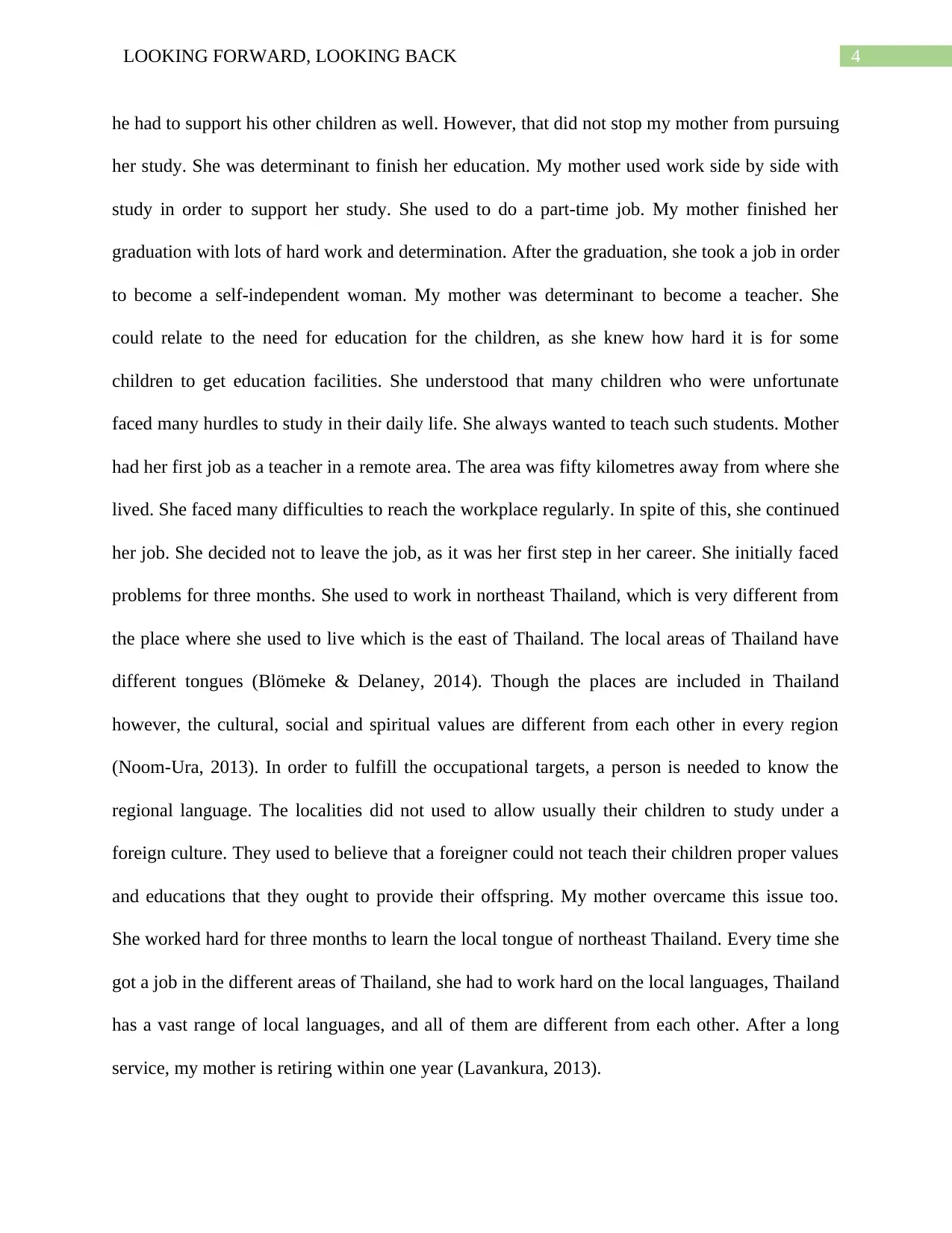
4LOOKING FORWARD, LOOKING BACK
he had to support his other children as well. However, that did not stop my mother from pursuing
her study. She was determinant to finish her education. My mother used work side by side with
study in order to support her study. She used to do a part-time job. My mother finished her
graduation with lots of hard work and determination. After the graduation, she took a job in order
to become a self-independent woman. My mother was determinant to become a teacher. She
could relate to the need for education for the children, as she knew how hard it is for some
children to get education facilities. She understood that many children who were unfortunate
faced many hurdles to study in their daily life. She always wanted to teach such students. Mother
had her first job as a teacher in a remote area. The area was fifty kilometres away from where she
lived. She faced many difficulties to reach the workplace regularly. In spite of this, she continued
her job. She decided not to leave the job, as it was her first step in her career. She initially faced
problems for three months. She used to work in northeast Thailand, which is very different from
the place where she used to live which is the east of Thailand. The local areas of Thailand have
different tongues (Blömeke & Delaney, 2014). Though the places are included in Thailand
however, the cultural, social and spiritual values are different from each other in every region
(Noom-Ura, 2013). In order to fulfill the occupational targets, a person is needed to know the
regional language. The localities did not used to allow usually their children to study under a
foreign culture. They used to believe that a foreigner could not teach their children proper values
and educations that they ought to provide their offspring. My mother overcame this issue too.
She worked hard for three months to learn the local tongue of northeast Thailand. Every time she
got a job in the different areas of Thailand, she had to work hard on the local languages, Thailand
has a vast range of local languages, and all of them are different from each other. After a long
service, my mother is retiring within one year (Lavankura, 2013).
he had to support his other children as well. However, that did not stop my mother from pursuing
her study. She was determinant to finish her education. My mother used work side by side with
study in order to support her study. She used to do a part-time job. My mother finished her
graduation with lots of hard work and determination. After the graduation, she took a job in order
to become a self-independent woman. My mother was determinant to become a teacher. She
could relate to the need for education for the children, as she knew how hard it is for some
children to get education facilities. She understood that many children who were unfortunate
faced many hurdles to study in their daily life. She always wanted to teach such students. Mother
had her first job as a teacher in a remote area. The area was fifty kilometres away from where she
lived. She faced many difficulties to reach the workplace regularly. In spite of this, she continued
her job. She decided not to leave the job, as it was her first step in her career. She initially faced
problems for three months. She used to work in northeast Thailand, which is very different from
the place where she used to live which is the east of Thailand. The local areas of Thailand have
different tongues (Blömeke & Delaney, 2014). Though the places are included in Thailand
however, the cultural, social and spiritual values are different from each other in every region
(Noom-Ura, 2013). In order to fulfill the occupational targets, a person is needed to know the
regional language. The localities did not used to allow usually their children to study under a
foreign culture. They used to believe that a foreigner could not teach their children proper values
and educations that they ought to provide their offspring. My mother overcame this issue too.
She worked hard for three months to learn the local tongue of northeast Thailand. Every time she
got a job in the different areas of Thailand, she had to work hard on the local languages, Thailand
has a vast range of local languages, and all of them are different from each other. After a long
service, my mother is retiring within one year (Lavankura, 2013).
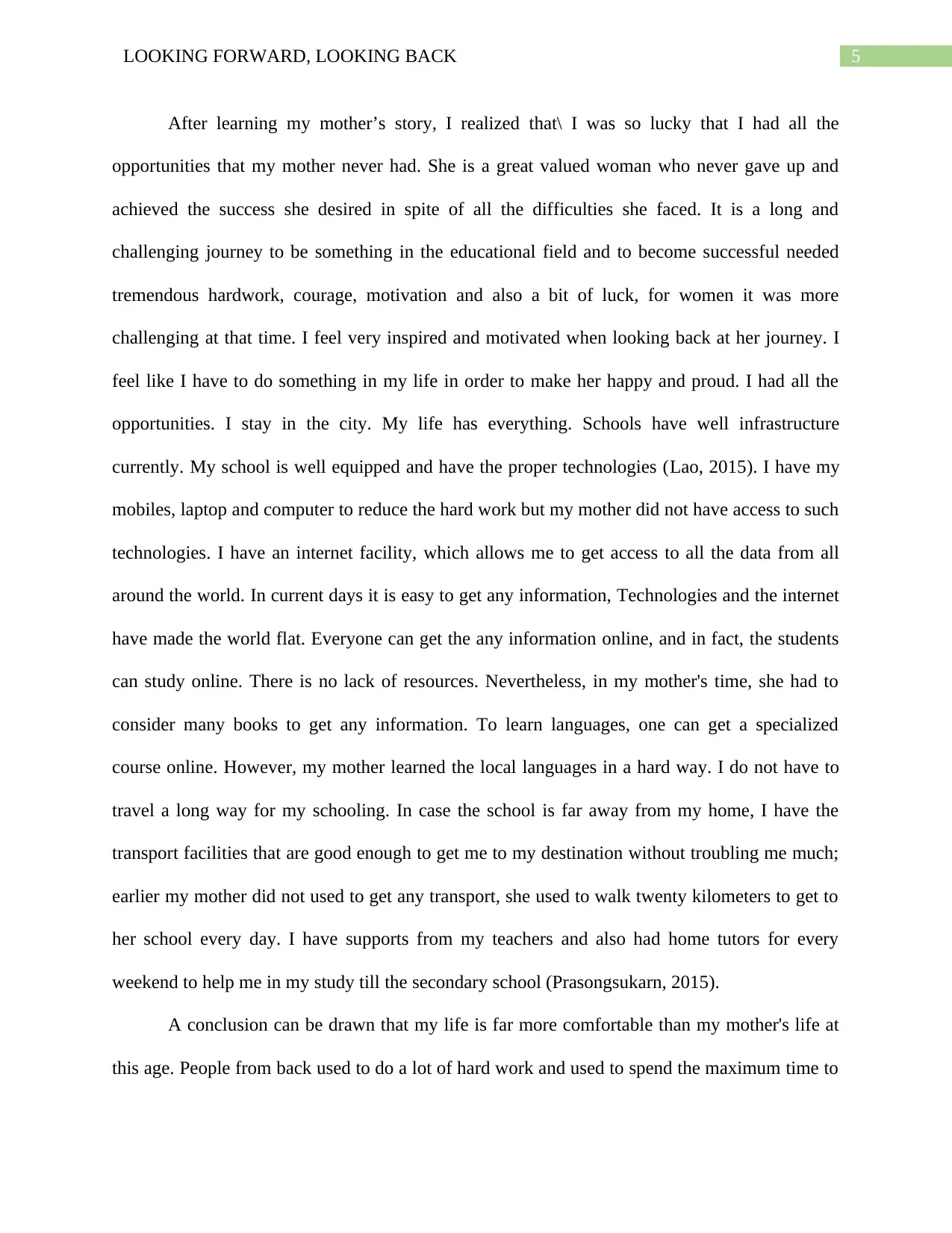
5LOOKING FORWARD, LOOKING BACK
After learning my mother’s story, I realized that\ I was so lucky that I had all the
opportunities that my mother never had. She is a great valued woman who never gave up and
achieved the success she desired in spite of all the difficulties she faced. It is a long and
challenging journey to be something in the educational field and to become successful needed
tremendous hardwork, courage, motivation and also a bit of luck, for women it was more
challenging at that time. I feel very inspired and motivated when looking back at her journey. I
feel like I have to do something in my life in order to make her happy and proud. I had all the
opportunities. I stay in the city. My life has everything. Schools have well infrastructure
currently. My school is well equipped and have the proper technologies (Lao, 2015). I have my
mobiles, laptop and computer to reduce the hard work but my mother did not have access to such
technologies. I have an internet facility, which allows me to get access to all the data from all
around the world. In current days it is easy to get any information, Technologies and the internet
have made the world flat. Everyone can get the any information online, and in fact, the students
can study online. There is no lack of resources. Nevertheless, in my mother's time, she had to
consider many books to get any information. To learn languages, one can get a specialized
course online. However, my mother learned the local languages in a hard way. I do not have to
travel a long way for my schooling. In case the school is far away from my home, I have the
transport facilities that are good enough to get me to my destination without troubling me much;
earlier my mother did not used to get any transport, she used to walk twenty kilometers to get to
her school every day. I have supports from my teachers and also had home tutors for every
weekend to help me in my study till the secondary school (Prasongsukarn, 2015).
A conclusion can be drawn that my life is far more comfortable than my mother's life at
this age. People from back used to do a lot of hard work and used to spend the maximum time to
After learning my mother’s story, I realized that\ I was so lucky that I had all the
opportunities that my mother never had. She is a great valued woman who never gave up and
achieved the success she desired in spite of all the difficulties she faced. It is a long and
challenging journey to be something in the educational field and to become successful needed
tremendous hardwork, courage, motivation and also a bit of luck, for women it was more
challenging at that time. I feel very inspired and motivated when looking back at her journey. I
feel like I have to do something in my life in order to make her happy and proud. I had all the
opportunities. I stay in the city. My life has everything. Schools have well infrastructure
currently. My school is well equipped and have the proper technologies (Lao, 2015). I have my
mobiles, laptop and computer to reduce the hard work but my mother did not have access to such
technologies. I have an internet facility, which allows me to get access to all the data from all
around the world. In current days it is easy to get any information, Technologies and the internet
have made the world flat. Everyone can get the any information online, and in fact, the students
can study online. There is no lack of resources. Nevertheless, in my mother's time, she had to
consider many books to get any information. To learn languages, one can get a specialized
course online. However, my mother learned the local languages in a hard way. I do not have to
travel a long way for my schooling. In case the school is far away from my home, I have the
transport facilities that are good enough to get me to my destination without troubling me much;
earlier my mother did not used to get any transport, she used to walk twenty kilometers to get to
her school every day. I have supports from my teachers and also had home tutors for every
weekend to help me in my study till the secondary school (Prasongsukarn, 2015).
A conclusion can be drawn that my life is far more comfortable than my mother's life at
this age. People from back used to do a lot of hard work and used to spend the maximum time to
⊘ This is a preview!⊘
Do you want full access?
Subscribe today to unlock all pages.

Trusted by 1+ million students worldwide
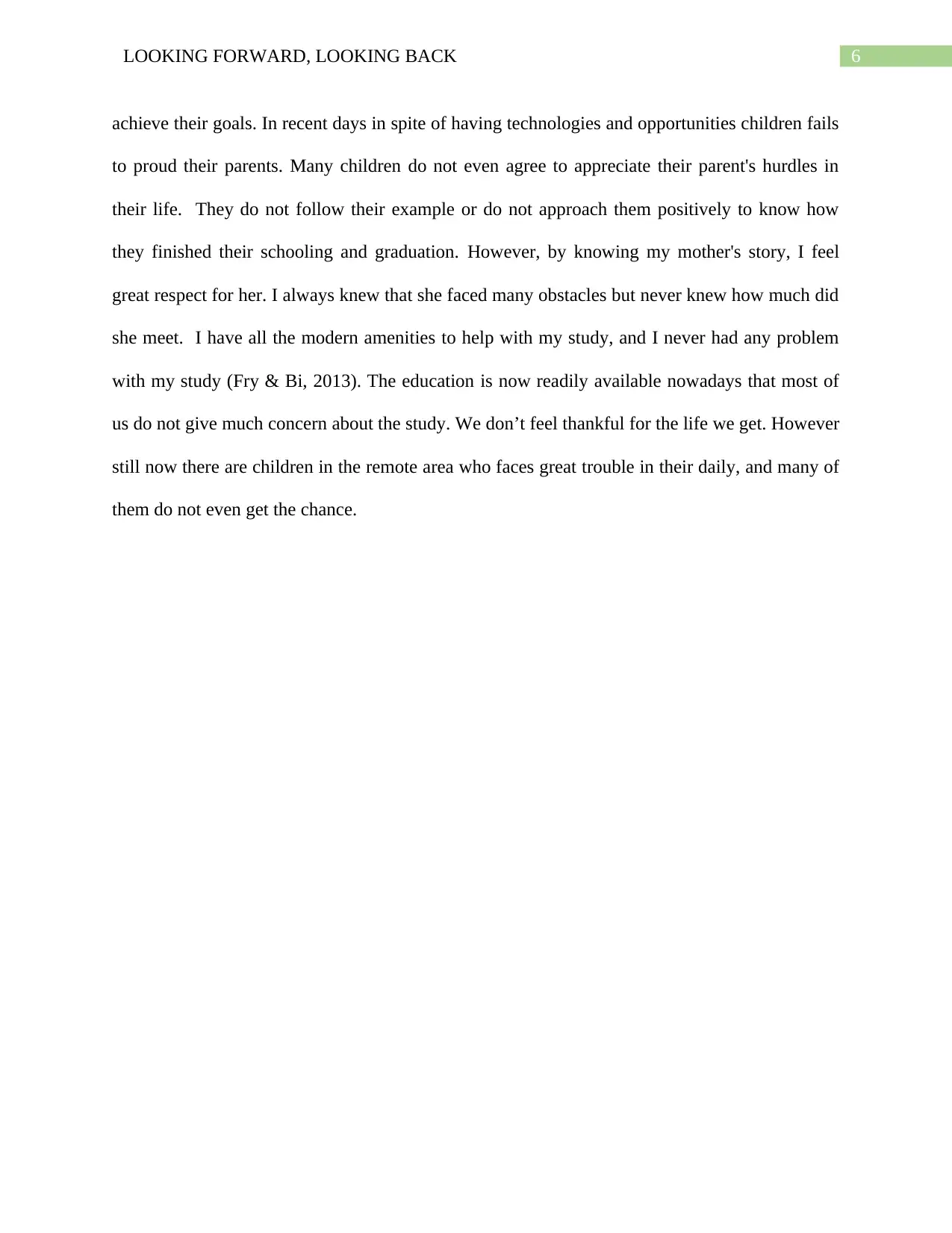
6LOOKING FORWARD, LOOKING BACK
achieve their goals. In recent days in spite of having technologies and opportunities children fails
to proud their parents. Many children do not even agree to appreciate their parent's hurdles in
their life. They do not follow their example or do not approach them positively to know how
they finished their schooling and graduation. However, by knowing my mother's story, I feel
great respect for her. I always knew that she faced many obstacles but never knew how much did
she meet. I have all the modern amenities to help with my study, and I never had any problem
with my study (Fry & Bi, 2013). The education is now readily available nowadays that most of
us do not give much concern about the study. We don’t feel thankful for the life we get. However
still now there are children in the remote area who faces great trouble in their daily, and many of
them do not even get the chance.
achieve their goals. In recent days in spite of having technologies and opportunities children fails
to proud their parents. Many children do not even agree to appreciate their parent's hurdles in
their life. They do not follow their example or do not approach them positively to know how
they finished their schooling and graduation. However, by knowing my mother's story, I feel
great respect for her. I always knew that she faced many obstacles but never knew how much did
she meet. I have all the modern amenities to help with my study, and I never had any problem
with my study (Fry & Bi, 2013). The education is now readily available nowadays that most of
us do not give much concern about the study. We don’t feel thankful for the life we get. However
still now there are children in the remote area who faces great trouble in their daily, and many of
them do not even get the chance.
Paraphrase This Document
Need a fresh take? Get an instant paraphrase of this document with our AI Paraphraser
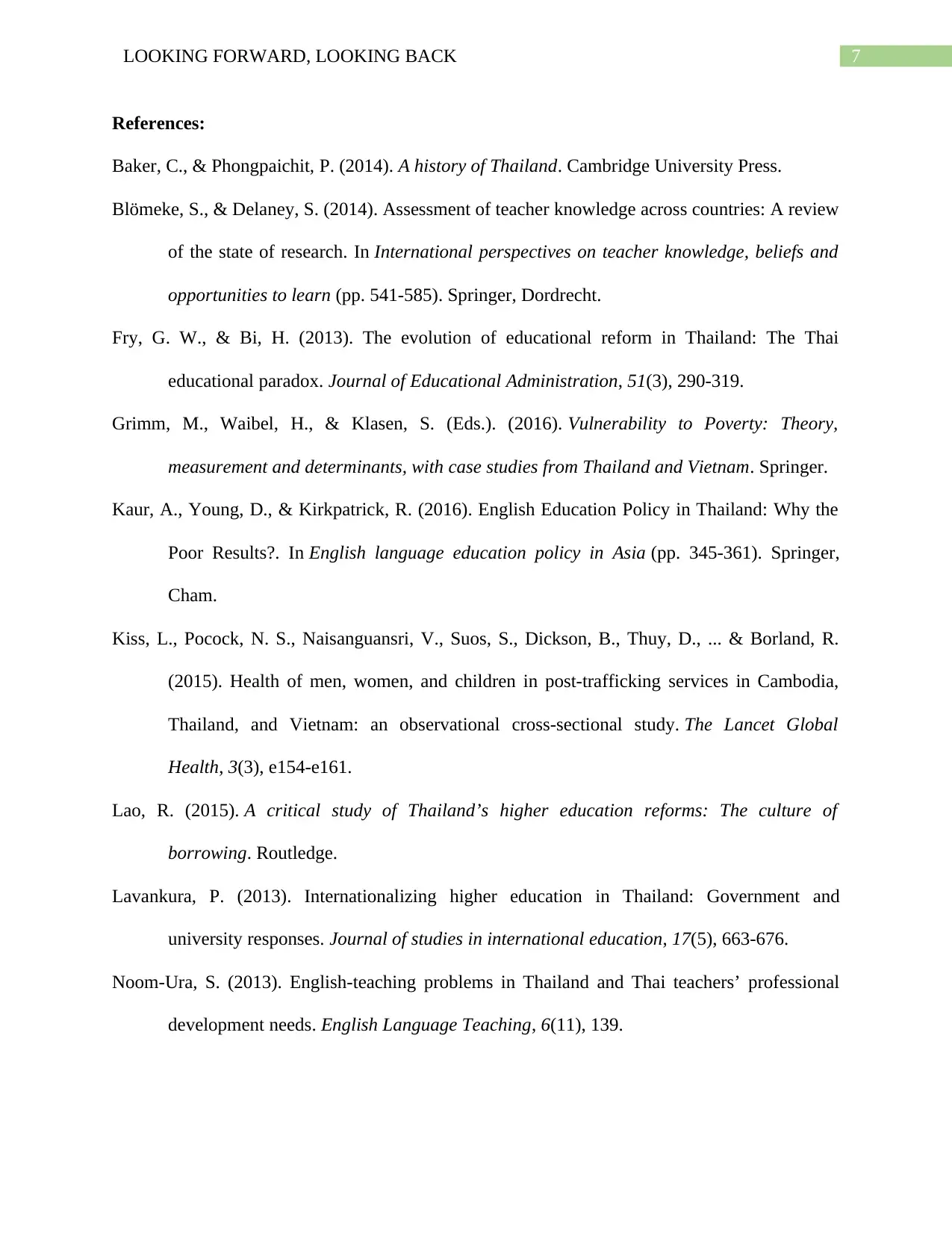
7LOOKING FORWARD, LOOKING BACK
References:
Baker, C., & Phongpaichit, P. (2014). A history of Thailand. Cambridge University Press.
Blömeke, S., & Delaney, S. (2014). Assessment of teacher knowledge across countries: A review
of the state of research. In International perspectives on teacher knowledge, beliefs and
opportunities to learn (pp. 541-585). Springer, Dordrecht.
Fry, G. W., & Bi, H. (2013). The evolution of educational reform in Thailand: The Thai
educational paradox. Journal of Educational Administration, 51(3), 290-319.
Grimm, M., Waibel, H., & Klasen, S. (Eds.). (2016). Vulnerability to Poverty: Theory,
measurement and determinants, with case studies from Thailand and Vietnam. Springer.
Kaur, A., Young, D., & Kirkpatrick, R. (2016). English Education Policy in Thailand: Why the
Poor Results?. In English language education policy in Asia (pp. 345-361). Springer,
Cham.
Kiss, L., Pocock, N. S., Naisanguansri, V., Suos, S., Dickson, B., Thuy, D., ... & Borland, R.
(2015). Health of men, women, and children in post-trafficking services in Cambodia,
Thailand, and Vietnam: an observational cross-sectional study. The Lancet Global
Health, 3(3), e154-e161.
Lao, R. (2015). A critical study of Thailand’s higher education reforms: The culture of
borrowing. Routledge.
Lavankura, P. (2013). Internationalizing higher education in Thailand: Government and
university responses. Journal of studies in international education, 17(5), 663-676.
Noom-Ura, S. (2013). English-teaching problems in Thailand and Thai teachers’ professional
development needs. English Language Teaching, 6(11), 139.
References:
Baker, C., & Phongpaichit, P. (2014). A history of Thailand. Cambridge University Press.
Blömeke, S., & Delaney, S. (2014). Assessment of teacher knowledge across countries: A review
of the state of research. In International perspectives on teacher knowledge, beliefs and
opportunities to learn (pp. 541-585). Springer, Dordrecht.
Fry, G. W., & Bi, H. (2013). The evolution of educational reform in Thailand: The Thai
educational paradox. Journal of Educational Administration, 51(3), 290-319.
Grimm, M., Waibel, H., & Klasen, S. (Eds.). (2016). Vulnerability to Poverty: Theory,
measurement and determinants, with case studies from Thailand and Vietnam. Springer.
Kaur, A., Young, D., & Kirkpatrick, R. (2016). English Education Policy in Thailand: Why the
Poor Results?. In English language education policy in Asia (pp. 345-361). Springer,
Cham.
Kiss, L., Pocock, N. S., Naisanguansri, V., Suos, S., Dickson, B., Thuy, D., ... & Borland, R.
(2015). Health of men, women, and children in post-trafficking services in Cambodia,
Thailand, and Vietnam: an observational cross-sectional study. The Lancet Global
Health, 3(3), e154-e161.
Lao, R. (2015). A critical study of Thailand’s higher education reforms: The culture of
borrowing. Routledge.
Lavankura, P. (2013). Internationalizing higher education in Thailand: Government and
university responses. Journal of studies in international education, 17(5), 663-676.
Noom-Ura, S. (2013). English-teaching problems in Thailand and Thai teachers’ professional
development needs. English Language Teaching, 6(11), 139.
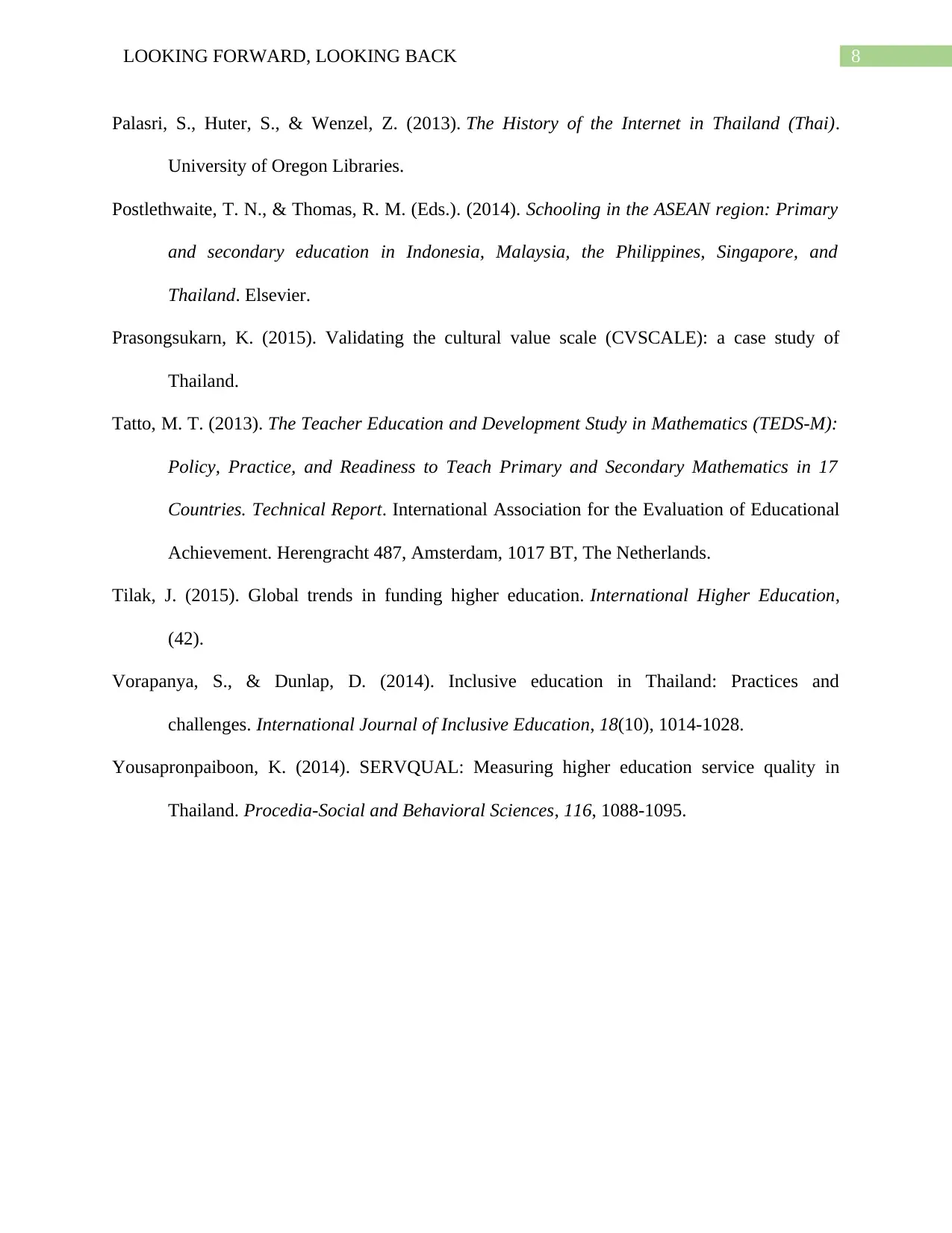
8LOOKING FORWARD, LOOKING BACK
Palasri, S., Huter, S., & Wenzel, Z. (2013). The History of the Internet in Thailand (Thai).
University of Oregon Libraries.
Postlethwaite, T. N., & Thomas, R. M. (Eds.). (2014). Schooling in the ASEAN region: Primary
and secondary education in Indonesia, Malaysia, the Philippines, Singapore, and
Thailand. Elsevier.
Prasongsukarn, K. (2015). Validating the cultural value scale (CVSCALE): a case study of
Thailand.
Tatto, M. T. (2013). The Teacher Education and Development Study in Mathematics (TEDS-M):
Policy, Practice, and Readiness to Teach Primary and Secondary Mathematics in 17
Countries. Technical Report. International Association for the Evaluation of Educational
Achievement. Herengracht 487, Amsterdam, 1017 BT, The Netherlands.
Tilak, J. (2015). Global trends in funding higher education. International Higher Education,
(42).
Vorapanya, S., & Dunlap, D. (2014). Inclusive education in Thailand: Practices and
challenges. International Journal of Inclusive Education, 18(10), 1014-1028.
Yousapronpaiboon, K. (2014). SERVQUAL: Measuring higher education service quality in
Thailand. Procedia-Social and Behavioral Sciences, 116, 1088-1095.
Palasri, S., Huter, S., & Wenzel, Z. (2013). The History of the Internet in Thailand (Thai).
University of Oregon Libraries.
Postlethwaite, T. N., & Thomas, R. M. (Eds.). (2014). Schooling in the ASEAN region: Primary
and secondary education in Indonesia, Malaysia, the Philippines, Singapore, and
Thailand. Elsevier.
Prasongsukarn, K. (2015). Validating the cultural value scale (CVSCALE): a case study of
Thailand.
Tatto, M. T. (2013). The Teacher Education and Development Study in Mathematics (TEDS-M):
Policy, Practice, and Readiness to Teach Primary and Secondary Mathematics in 17
Countries. Technical Report. International Association for the Evaluation of Educational
Achievement. Herengracht 487, Amsterdam, 1017 BT, The Netherlands.
Tilak, J. (2015). Global trends in funding higher education. International Higher Education,
(42).
Vorapanya, S., & Dunlap, D. (2014). Inclusive education in Thailand: Practices and
challenges. International Journal of Inclusive Education, 18(10), 1014-1028.
Yousapronpaiboon, K. (2014). SERVQUAL: Measuring higher education service quality in
Thailand. Procedia-Social and Behavioral Sciences, 116, 1088-1095.
⊘ This is a preview!⊘
Do you want full access?
Subscribe today to unlock all pages.

Trusted by 1+ million students worldwide
1 out of 9
Related Documents
Your All-in-One AI-Powered Toolkit for Academic Success.
+13062052269
info@desklib.com
Available 24*7 on WhatsApp / Email
![[object Object]](/_next/static/media/star-bottom.7253800d.svg)
Unlock your academic potential
Copyright © 2020–2026 A2Z Services. All Rights Reserved. Developed and managed by ZUCOL.



